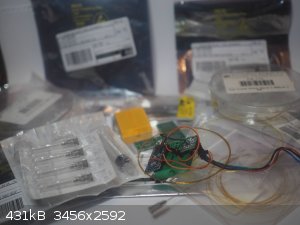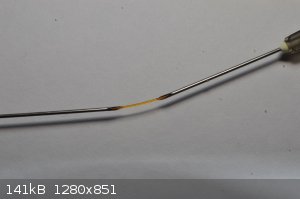
omnilytic - 19-8-2015 at 04:41
Hi guys, we are working on making a portable Capillary Electrophoresis system for the 2015 Hackaday Prize:
https://hackaday.io/project/6835-cderpillar-open-ce-cd
http://www.youtube.com/watch?v=35-2XdD4sAU
The aim is to make an analysis system capable of being operated by a novice, that gives high precision, repeatable readings. Our initial focus is on
simultaneously detecting cations and anions automatically in a stream and uploading the information to the cloud for public access to avoid the large
number of deaths caused by insufficient information gathering capacity (spatial and temporal).
After this, we aim to build a Sanger DNA sequencer, that could initially be used for small sequencing tasks, such as reading a single PCR product
(sequencing a metabolism enzyme for personalised medicine).
Personally, I want the genotyping ability because I am selectively crossing the Oddly-shaped Peter Pepper with black, purple and rainbow chilis to make a new variety.
Really keen to get this into the hands of some chemists as well, as I am sure you can see the applications for low cost lab grade analysis (live
reaction monitoring, enantiomeric detection, DNA!). At the moment we use a novel wireless conductivity sensor (see attached), which is actually more
sensitive than UV detectors (due to the small optical path length of the capillary) and costs around $100. C4D is capable of detecting most analytes
down to ug/L levels, perfect for water testing.
We made the project because we wanted to be able to measure 20+ ions with high accuracy in our SALT WATER coral breeding aquariums. The only system
that could give live readings are ion specific electrodes. There are several problems with ISEs:
Ions interference from common ions:
This is a problem with most ISEs. e.g a nitrate selective electrode we wanted counted every 30 units of chloride as one of nitrate. NaCl makes up
~3.5% of seawater by weight and in aquariums nitrate needs to be kept around 1-20ppm, making meaningful measurements with ISEs impossible.
Strict buffer conditions:
Each electrode usually has a very narrow range of operating parameters, including pH. This makes it an expensive and complex exercise to design a unit
to run autonomously at low cost.
As the weeks go by, we will be updating the community with progress on the project and upon completion, full build instructions will be posted in the
Prepublication section on SM.
Once everything is squared away with development, we plan make these units available. Looking forward to hearing from the community if you guys have
any thoughts on our design/features you could see being useful. Our backgrounds are in maths and biology, so we are open to feedback amateurs/pros in
the other disciplines!
Will post back here when more schematics are completed.
[Edited on 19-8-2015 by omnilytic]


Attachment: DissB_8229.pdf (6.7MB)
This file has been downloaded 585 times
aga - 19-8-2015 at 13:59
This looks like a Wonderful project, however there appear to be a few misconceptions already.
Yes, Water Quality is a very good thing to know.
Villages in Africa do not have internet, due to the infrastructure simply not existing, and/or the local people cannot afford to have it.
Cloud based processing kinda fails in that scenario.
Most African villages cannot afford a $500 device.
It looks to me that a HV generator and CE-C<sup>4</sup>D system can be made a lot cheaper, based on what you've already done.
I need to get involved with this.
[Edited on 19-8-2015 by aga]
[Edited on 19-8-2015 by aga]
omnilytic - 20-8-2015 at 00:40
We are planning on releasing a barebones device aimed at just doing water, thanks for the feedback! We could make it so much cheaper if we could buy
every part in lots of 1000.
As for data processing, it can be accomplished directly on the unit or sent over a variety of platforms, such as shortwave radio, Satellite data.
Most of the cost in the instrument is in buying parts that we know are going to give reproducible results. I have a lot of issues with projects such
as MySpectral that claim to provide a wide range of analytical capabilities (monitoring nutritional content of food), but ultimately fall down as they
are not engineered correctly!
[Edited on 20-8-2015 by omnilytic]
